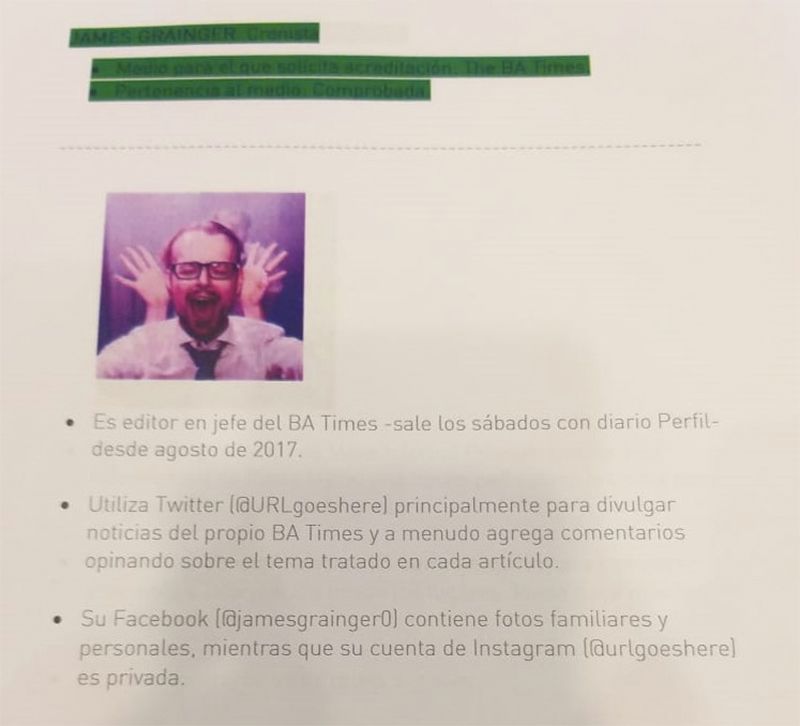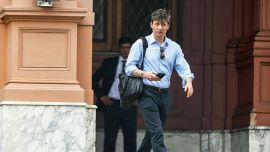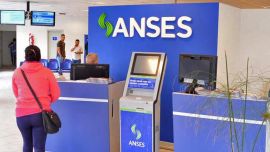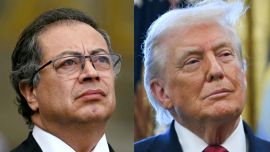Mauricio Macri has found himself back in the national spotlight after the emergence of extraordinary claims alleging the Federal Intelligence Agency (AFI) – headed at the time by his close ally Gustavo Arribas during the former president’s 2015-2019 administration – carried out illegal espionage more than 500 journalists, academics, politicians and business leaders.
The allegations centre on two cases – the first in the hands of Lomas de Zamora federal judge Federico Villena, who is investigating alleged espionage on politicians and union leaders; the second in the hands of federal judge Marcelo Martínez de Giorgi, who is probing claims of illegal spying against more than 400 journalists, as well as academics, NGO leaders and business leaders.
On Tuesday, via a statement from his lawyers filed with Judge Marcelo Martínez de Giorgi, Arribas denied "having committed any crime" during his time leading the AFI.
"I never arranged, formally or informally, the undue interference of communications or emails of any kind," Arribas said.
“The facts contained in the complaint are so serious that, from now on, I indicate my concern and interest in their investigation, for the sake of discovering the truth," said the ex-AFI chief.
Prior to heading the federal intelligence agency, Arribas had no prior public service, having worked as a notary and a football agent. He is a close personal friend of Macri.
The espionage claims against politicians are particularly notable. As well as names like Vice-President Cristina Fernández de Kirchner, there are also a host of unexpected names, including members of Macri's Juntos por el Cambio coalition, such as former Buenos Aires Province governor María Eugenia Vidal and Buenos Aires City mayor Horacio Rodríguez Larreta.
In a quip referencing her own legal woes and allegations directed at herself, Fernández de Kirchner declared in a video this week that the Macri administration was the “true illicit association."
Claims against reporters
In explosive claims that emerged at the tail-end of last week, more than 400 journalists – including two Buenos Aires Times staffers and numerous foreign reporters – appeared on a list of people to be investigated in relation to the G20 and World Trade Organisation (WTO) summits held in the capital in recent years.
In total, 403 journalists, 28 academics, 58 businesspeople and prominent figures from civil society were allegedly subject to illegal espionage, as well as socialist party leaders. The names were filed in an Excel spreadsheet that was presented to courts last Friday and leaked over the weekend.
The documents relating to the case were found in three dossiers named "2017", "G20 Journalists" and "Miscellaneous," discovered in a safe in the office of the AFI's former director of counterintelligence. Each file contains brief references to the political or social stances of some of the journalists, many gleaned from social media posts, though some had no comment at all, or merely noted that the person worked for a news outlet.
Among those named were two Times staffers: Editor-in-Chief James Grainger and former reporter Giulia Petroni. The Times was able to view images from both their files, which reveal AFI officials studied their social media accounts and conducted background research on them as part of their monitoring.

Reporters from a host of various local outlets – including 11 journalists and photographers from Perfil and Noticias – were also investigated. Also listed were journalists for international media outlets such as the Associated Press, Reuters, Bloomberg, AFP and CNN.
"The investigation into the journalists was straightforward. They dug up information from social media and that way built an ideological and political profile," a government source told AFP on Sunday.
Buenos Aires hosted the 11th WTO Ministerial Conference in 2017 and the 13th G20 Summit a year later, with both events falling during former president Mauricio Macri’s single 2015-2019 term in office.
Complaint
This complaint was lodged on Friday by Cristina Caamaño, who was tasked by President Alberto Fernández with carrying out an audit and overhaul of the AFI and its working practices soon after the Peronist leader took office in December 2019.
It was filed in support of a federal prosecutor's complaint accusing the former leadership of Argentina's Federal Intelligence Agency of domestic espionage without a judicial order. It now lies with Federal Criminal and Correctional Court No. 11, led by Judge Marcelo Martínez de Giorgi. The prosecutor in charge is Paloma Ochoa.
Caamaño has asked for an investigation to be opened against Arribas, his deputy Silvina Majdalani, as well as Macri as the person "responsible for setting strategic guidelines and the objectives of national intelligence policy."
The complaint states that the background checks on journalists were "neither ordered nor authorised by any magistrate."
According to the complaint, the information collated by AFI officials included "political preferences, social media posts, sympathy for feminist groups, or political and/or cultural content among others." The comments included whether or not "they were critical of the [Macri] government."
Other comments referred to "showing affinity for Peronism," which was then in opposition, "supporting the government," "asking on Facebook for the liberation of Lula," a reference to the then-jailed leftist former Brazilian president Luiz Inácio Lula da Silva (he has since been released), or if they had "signed a petition for legalised abortion."
Each profile was marked in either green, yellow or red, supposedly an indication aimed at assisting the Foreign Ministry in the accreditation processes for the WTO and G20 events. According to reporting by Perfil journalist Rosario Ayerdi, yellow is a reference to "critical political posture," with green meaning the journalist was approved for accreditation and red meaning the outlet did not exist or the journalist did not work there.
The ACERA foreign correspondents association hit out at Macri for the "inadmissible" investigations, while two Argentine press unions – SIPREBA and FATPREN – also blasted the former administration.
The Forum for Argentine Journalism (FOPEA said on Twitter that it is following the case "with attention and concern" and described the practices as "intolerable in a democracy."
Deeper look
The alleged dossier relating to the WTO conference is far more exhaustive and contains a host of information on businesspeople, trade unionists and social leaders. A number of personal details are listed, such as salaries and wealth, bank details, property deeds, as well as domestic employees and car registrations.
Even members of well-known local groups such as the Sociedad Rural Argentina (SRA) were investigated, according to a report from journalist Luciana Bertoia published on Sunday. Other names include Pablo Secchi, from the NGO Poder Ciudadano, who had a 10-page dossier that included even his mobile phone number, as well as his colleague María Emilia Berazategui.
It's not the first time Macri has faced claims of alleged illegal espionage. He is currently under investigation for alleged espionage during his presidency on both political allies and opponents, including a host of high-profile names.
The former president was also prosecuted for spying while serving as mayor of Buenos Aires from 2007-2015, though that case was dismissed two weeks after he assumed the presidency.
The former president, nor the leader of his PRO party, former security minister Patricia Bullrich, have commented on the claims.
Macri is also under investigation over government handling of a debt owed by one of his family's businesses, of a wind-farm contract and campaign financing.
Politicians allegedly spied on by the AFI
Former president Mauricio Macri and ex-AFI chief Gustavo Arribas stand accused of carrying out illegal espionage on journalists, trade unionists, academics, businesspeople and the leaders of NGOs and social groups.
In one case, the duo also face allegations of carrying out unwarranted surveillance on a host of politicians, including those allied to the PRO leader and those in opposition. Among those called set to be called as witnesses are Vice-President Cristina Fernández de Kirchner and Buenos Aires City Mayor Horacio Rodríguez Larreta.
The Noticias Argentinas news agency this week gained access to a list of individuals believed to have been victims of illegal espionage. This evidence is currently with Federal Court No. 1 in Lomas de Zamora, led by Judge Federico Villena. Here are the names that were included on the list:
– Hugo Alconada Mon, La Nación journalist.
– José Luis Barrionuevo, trade union leader.
– Pablo Oscar Bruera, former mayor of La Plata.
– Graciela Camaño, national deputy (Consenso Federal).
– Maurice Fabián Closs, senator for Misiones (Frente de Todos).
– José María Di Paola, priest, close to Pope Francis.
– Cristina Fernández de Kirchner, vice-president (Frente de Todos).
– Jorge Ferraresi, mayor of Avellaneda (Frente de Todos).
– Martín Insaurralde, mayor of Lomas de Zamora (Frente de Todos).
– Martín Irúrzun, president of the Federal Criminal and Correctional Appeals Chamber.
– Jorge Rubén Lugones, priest, bishop of Lomas de Zamora.
– Nicolás María Massot, ex-national deputy (Cambiemos).
– Emilio Monzó, former president of the Chamber of Deputies (Cambiemos).
– Hugo Antonio Moyano, trade union leader, teamster.
– Salvatore Pica, members of the Community of the Mapuche People of Argentina.
– Horacio Antonio Rodríguez Larreta, Buenos Aires City mayor (Juntos por el Cambio).
– Diego César Santilli, Buenos Aires City deputy mayor (Juntos por el Cambio).
– Marcelo Veneranda, La Nación journalist.
– María Eugenia Vidal, former governor of Buenos Aires Province (Cambiemos).
– Waldo Ezequiel Wolff, national deputy (Juntos por el Cambio).

























Comments